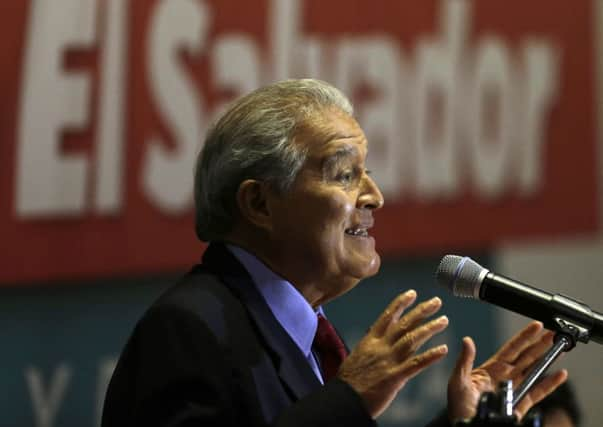Former Salvadorian rebel leader wins presidency


With 100 per cent of the votes counted, the electoral court announced on its website shortly after midnight that Sanchez Ceren, candidate of the ruling Farabundo Marti National Liberation Front, the FMLN, got 50.1 per cent of the votes.
Norman Quijano, of the Conservative Nationalist Republican Alliance, or Arena, got 49.9 per cent support in Sunday’s run-off.
Advertisement
Hide AdAdvertisement
Hide AdWith about three million ballots cast, Mr Ceren won by less than 7,000 votes. He is the first former rebel commander to win the presidency.
Outgoing president Mauricio Funes was a journalist sympathetic to the FMLN during the civil war but was never a guerrilla. The once long-ruling Arena lost the presidency to Mr Funes in 2009 after two decades in power.
Mr Ceren, 69, and his supporters celebrated their victory at a hotel in downtown San Salvador but shortly after the announcement he urged them to go home and stay calm.
“This is a very exciting moment, but also a moment of commitment for the FMLN,” said Lorena Pena, an FMLN congresswoman. “We will be fully committed with the people.”
Mr Quijano, 67, has said he will dispute the results alleging fraud. Arena leaders said they would continue taking to the streets to demand a recount.
Mr Quijano has been organising Venezuela-style protests and called on the army to defend the state, but the defence minister, General David Munguia Payes, and the army’s top commanders said on Wednesday that they would not intervene.
“We are committed to respecting the official results that are issued by the Supreme Electoral Tribunal,” Gen Munguia Payes said. “We repeat that we are committed to strictly respecting the sovereign decision that the people of El Salvador expressed at the ballot box.”
Mr Quijano’s suggestion of military intervention had called up echoes of the 1980-92 war, when 76,000 people died in fighting between the military and FMLN rebels.
Advertisement
Hide AdAdvertisement
Hide AdAfter peace accords ended the conflict in 1992, the FMLN turned into a political party.
Mr Ceren campaigned on a promise to deepen the outgoing government’s popular social programmes and govern as a moderate. He said he envisioned ruling like Uruguay president Jose Mujica, a former guerrilla who formed an inclusive government. Mr Ceren was a top rebel commander who helped negotiate the peace accords that ended the civil war, in which the United States supported the government to prevent communism spreading in Latin America. Mr Quijano said that electoral authorities did not allow several of his campaign advertisements to run and claimed FMLN members were allowed to vote twice, but presented no evidence of this. He also claimed the electoral court was biased.
His supporters have demanded a recount. Officials only recounted votes at about 21 polling places, which would not be enough to alter the final results.
El Salvador has one of the highest murder rates in the world. A 2012 gang truce seemed to cut the daily average of 14 dead by half, but the drop was short-lived. Homicides, mostly of gang members, have risen again this year. Police statistics show 501 murders in the first two months of this year, arise of over 25 per cent on the same period of 2013.